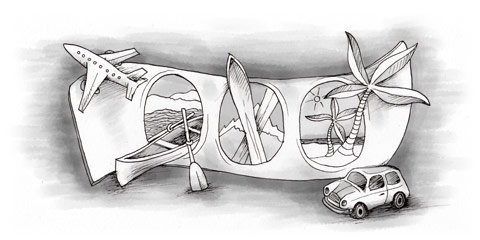Safety inspection
The first step is to ensure your car is roadworthy and meets Spanish vehicle regulations, such as tire tread and headlight specifications. You will need to take your car to an authorised agency for an official inspection known as an ITV (Inspección Técnica de Vehículos). If your car passes the inspection, you will be given a Certificate of Conformity (Certificado de Conformidad) and a Technical Test Certificate Card (Tarjeta de Inspección Técnica).
Cars purchased within the EU with a valid ‘roadworthy’ certificate (the equivalent of the Technical Test Certificate Card from your home country, such as the MOT in the UK), will not need an official inspection. The ITV will simply verify your existing document and issue a Certificate of Conformity.
Tax
The next step is to pay the car registration tax (Impuesto Especial sobre Determinados Medios de Transporte), local car tax (Impuesto Municipal sobre Vehículos de Tracción Mecánica/IVTM) and road tax (Impuesto de Circulación) at your local town hall (Padrón Municipal). The amount of each will vary depending on the value of your car, its CO2 emissions and the region.
Registration
You are now able to register your car and get your Spanish number plates. To do this, you will need to make an appointment at your nearest provincial traffic department (Jefatura Provincial de Tráfico) and take the following (to your appointment):
- An application form (available from the traffic department)
- ID (passport or residence card, with additional photocopies)
- Driver’s license
- Proof of Spanish address (Certificado de Empadronamiento)
- Confirmation of registration tax payment
- Confirmation of car tax payment
- Registration document (Permiso de Circulación y Permiso Para Conducción)
- Registration fee (€97.80)
- Technical Test Certificate Card or verified equivalent
- Certificate of Conformity
If you bought your car new within the EU:
- Proof of VAT payment (form 309 or 300 issued by the Agencia Estatal Tributaria)
If you bought your car ‘second-hand’ (used) within the EU:
- All original vehicle documents plus:
- If bought from a private owner - purchase agreement (translated into Spanish) and confirmation of payment of the property transfer tax
- If bought from a car dealer - AT invoice showing the company is registered in the EU (has an EU VAT number)
If you bought your car outside the EU:
- All original vehicle documents
- Single Administrative Document (SAD) issued by the Spanish Customs Office
For any clarification, the Dirección General de Tráfico (DGT) offers a detailed list of all the documentation needed.
Car Insurance
Now you must get your car insured. EU rules state that all cars need to be insured in their country of registration, so your newly Spanish-registered car needs to be insured by a Spanish insurance company, such as Linea Directa . The leading insurer offer all their services in English and are experts at helping expats get the right coverage. To find out more on car insurance in Spain, click here.




